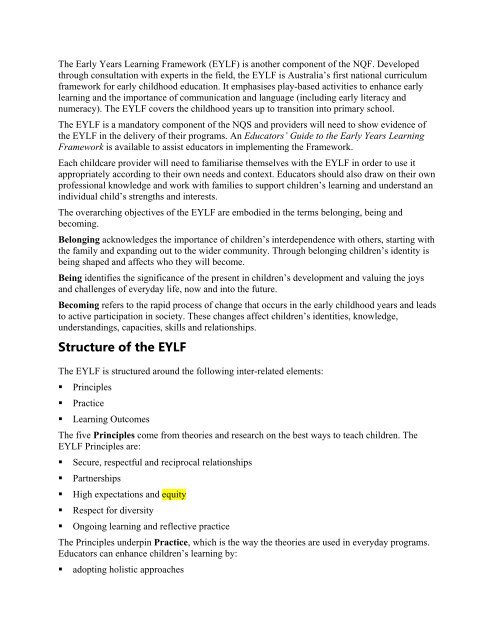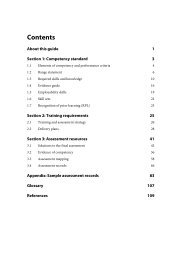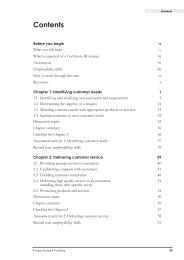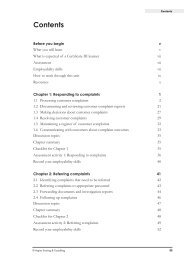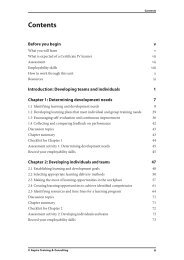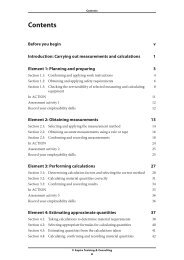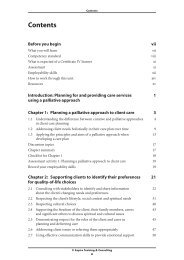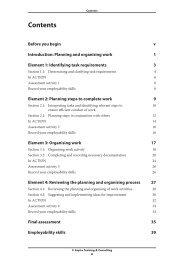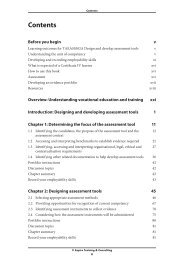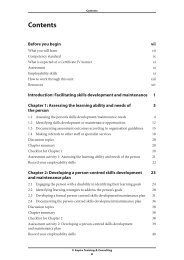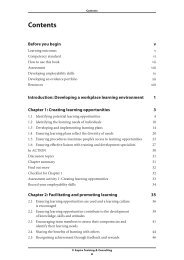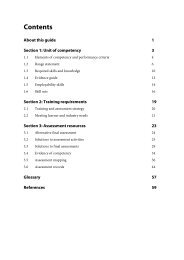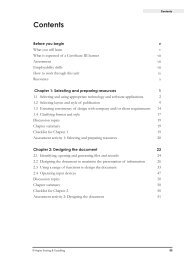(NQF) and the Early Years Learning Framework (EYLF)
(NQF) and the Early Years Learning Framework (EYLF)
(NQF) and the Early Years Learning Framework (EYLF)
Create successful ePaper yourself
Turn your PDF publications into a flip-book with our unique Google optimized e-Paper software.
The <strong>Early</strong> <strong>Years</strong> <strong>Learning</strong> <strong>Framework</strong> (<strong>EYLF</strong>) is ano<strong>the</strong>r component of <strong>the</strong> <strong>NQF</strong>. Developedthrough consultation with experts in <strong>the</strong> field, <strong>the</strong> <strong>EYLF</strong> is Australia’s first national curriculumframework for early childhood education. It emphasises play-based activities to enhance earlylearning <strong>and</strong> <strong>the</strong> importance of communication <strong>and</strong> language (including early literacy <strong>and</strong>numeracy). The <strong>EYLF</strong> covers <strong>the</strong> childhood years up to transition into primary school.The <strong>EYLF</strong> is a m<strong>and</strong>atory component of <strong>the</strong> NQS <strong>and</strong> providers will need to show evidence of<strong>the</strong> <strong>EYLF</strong> in <strong>the</strong> delivery of <strong>the</strong>ir programs. An Educators’ Guide to <strong>the</strong> <strong>Early</strong> <strong>Years</strong> <strong>Learning</strong><strong>Framework</strong> is available to assist educators in implementing <strong>the</strong> <strong>Framework</strong>.Each childcare provider will need to familiarise <strong>the</strong>mselves with <strong>the</strong> <strong>EYLF</strong> in order to use itappropriately according to <strong>the</strong>ir own needs <strong>and</strong> context. Educators should also draw on <strong>the</strong>ir ownprofessional knowledge <strong>and</strong> work with families to support children’s learning <strong>and</strong> underst<strong>and</strong> anindividual child’s strengths <strong>and</strong> interests.The overarching objectives of <strong>the</strong> <strong>EYLF</strong> are embodied in <strong>the</strong> terms belonging, being <strong>and</strong>becoming.Belonging acknowledges <strong>the</strong> importance of children’s interdependence with o<strong>the</strong>rs, starting with<strong>the</strong> family <strong>and</strong> exp<strong>and</strong>ing out to <strong>the</strong> wider community. Through belonging children’s identity isbeing shaped <strong>and</strong> affects who <strong>the</strong>y will become.Being identifies <strong>the</strong> significance of <strong>the</strong> present in children’s development <strong>and</strong> valuing <strong>the</strong> joys<strong>and</strong> challenges of everyday life, now <strong>and</strong> into <strong>the</strong> future.Becoming refers to <strong>the</strong> rapid process of change that occurs in <strong>the</strong> early childhood years <strong>and</strong> leadsto active participation in society. These changes affect children’s identities, knowledge,underst<strong>and</strong>ings, capacities, skills <strong>and</strong> relationships.Structure of <strong>the</strong> <strong>EYLF</strong>The <strong>EYLF</strong> is structured around <strong>the</strong> following inter-related elements:• Principles• Practice• <strong>Learning</strong> OutcomesThe five Principles come from <strong>the</strong>ories <strong>and</strong> research on <strong>the</strong> best ways to teach children. The<strong>EYLF</strong> Principles are:• Secure, respectful <strong>and</strong> reciprocal relationships• Partnerships• High expectations <strong>and</strong> equity• Respect for diversity• Ongoing learning <strong>and</strong> reflective practiceThe Principles underpin Practice, which is <strong>the</strong> way <strong>the</strong> <strong>the</strong>ories are used in everyday programs.Educators can enhance children’s learning by:• adopting holistic approaches


